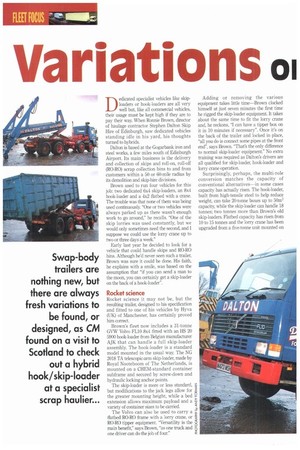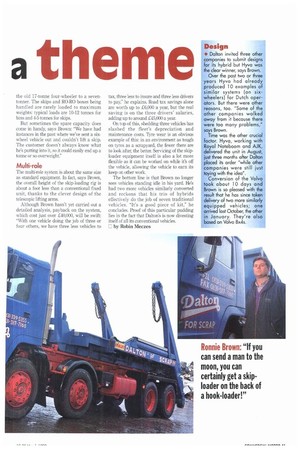REE1 FOCUS 111 ' 1111111=
Page 52

Page 53

If you've noticed an error in this article please click here to report it so we can fix it.
liar ations
a theme Swap-body trailers are nothing new, but there are always fresh variations to be found, or designed, as CM found on a visit to Scotland to check out a hybrid hook/skip-loader at a specialist scrap haulier... Dedicated specialist vehicles like skiploaders or hook-loaders are all very well but, like all commercial vehicles, their usage must be kept high if they are to pay their way. When Ronnie Brown, director of haulage contractor Stephen Dalton Skip Hire of Edinburgh, saw dedicated vehicles standing idle in his yard, his thoughts turned to hybrids.
Dalton is based at the Gogarbank iron and steel works, a few miles south of Edinburgh Airport. Its main business is the delivery and collection of skips and roll-on, roll-off (RO-RO) scrap collection bins to and from customers within a 50 or 60-mile radius by its demolition and skip-hire divisions.
Brown used to run four vehicles for this job: two dedicated 6x4 skip-loaders, an 8x4 hook-loader and a 4x2 flatbed with a crane. The trouble was that none of them was being used continuously. "One or two vehicles were always parked up as there wasn't enough work to go around," he recalls. "One of the skip lorries was used constantly, but we would only sometimes need the second, and I suppose we could use the lorry crane up to two or three days a week."
Early last year he decided to look for a vehicle that could handle skips and RO-RO bins. Although he'd never seen such a trailer, Brown was sure it could be done. His faith, he explains with a smile, was based on the assumption that "if you can send a man to the moon, you can certainly get a skip-loader on the back of a hook-loader".
Rocket science
Rocket science it may not be, but the resulting trailer, designed to his specification and fitted to one of his vehicles by Hyva (UK) of Manchester, has certainly proved him correct.
Brown's fleet now includes a 31-tonne GVW Volvo FLIO 8x4 fitted with an HS 20 5900 hook-loader from Belgian manufacturer AJK that can handle a full skip-loader assembly. The hook-loader is a standard model mounted in the usual way. The NG 2018 TA telescopic-arm skip-loader, made by Royal Nooteboom of The Netherlands, is mounted on a CHEM-standard container subframe and secured by screw-down and hydraulic locking anchor points.
The skip-loader is more or less standard, z but modifications to the jack legs allow for the greater mounting height, while a bed extension allows maximum payload and a variety of container sizes to be carried. < The Volvo can also be used to carry a '
flatbed RO-RO frame with a lorry crane, or RO-RO tipper equipment. "Versatility is the 8 main benefit," says Brown, as one truck and one driver can do the job of four."
Adding or removing the various equipment takes little time—Brown clocked himself at just seven minutes the first time he rigged the skip-loader equipment. It takes about the same time to fit the lorry crane and, he reckons, "I can have a tipper box on it in 10 minutes if necessary". Once it's on the back of the trailer and locked in place, "all you do is connect some pipes at the front end", says Brown. "That's the only difference to normal skip-loader equipment." No extra training was required as Dalton's drivers are all qualified for skip-loader, hook-loader and lorry crane operation.
Surprisingly, perhaps, the multi-role conversion matches the capacity of conventional alternatives—in some cases capacity has actually risen. The hook-loader, built from high-tensile steel to help reduce weight, can take 20-tonne boxes up to 50m3 capacity, while the skip-loader can handle 18 tonnes; two tonnes more than Brown's old skip-loaders. Flatbed capacity has risen from 10 to 15 tonnes and the lorry crane has been upgraded from a five-tonne unit mounted on
the old 17-tonne four-wheeler to a seventonner. The skips and RO-RO boxes being handled are rarely loaded to maximum weights: typical loads are 10-12 tonnes for bins and 4-5 tonnes for skips.
But sometimes the spare capacity does come in handy, says Brown: "We have had instances in the past where we've sent a sixwheel vehicle out and couldn't lift a skip. The customer doesn't always know what he's putting into it, so it could easily end up a tonne or so overweight,"
Multi-role
The multi-role system is about the same size as standard equipment. In fact. says Brown, the overall height of the skip-loading rig is about a foot less than a conventional fixed unit, thanks to the clever design of the telescopic lifting arms.
Although Brown hasn't yet carried out a detailed analysis, payback on the system, which cost just over £40,000, will be swift: "With one vehicle doing the job of three or four others, we have three less vehicles to
tax, three less to insure and three less drivers to pay," he explains. Road tax savings alone are worth up to £6,000 a year, but the real saving is on the three drivers' salaries, adding up to around ,C45,000 a year.
On top of this, shedding three vehicles has slashed the fleet's depreciation and maintenance costs, Tyre wear is an obvious example of this: in an environment as tough on tyres as a scrapyard, the fewer there are to look after, the better. Servicing of the skiploader equipment itself is also a lot more flexible as it can be worked on while it's off the vehicle, allowing the vehicle to earn its keep on other work.
The bottom line is that Brown no longer sees vehicles standing idle in his yard. He's had two more vehicles similarly converted and reckons that his trio of hybrids effectively do the job of seven traditional vehicles. "It's a good piece of kit," he concludes. Proof of this particular pudding lies in the fact that Dalton's is now divesting itself of all its conventional vehicles.
E by Robin Meczes
Design
• Dalton invited three other companies to submit designs for its hybrid but Hyva was the clear winner, says Brown.
Over the past two or three years Hyva had already produced 10 examples of similar systems on sixwheelers} for Dutch operators. But there were other reasons, too. "Some of the other companies walked away from it because there were too many problems," says Brown. Time was the other crucial factor. Hyva, working with Royal Noteboom and AJK, delivered the unit in August, ust three months after Dalton placed its order "while other companies were still just toying with the idea". Conversion of the Volvo took about 10 days and Brown is so pleased with the result that he has since taken delivery of Iwo more similarly equipoed vehicles; one arrivea last October, the other in January. They're also based on Volvo 8x4s.




























































































































